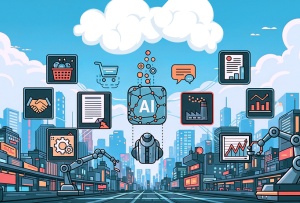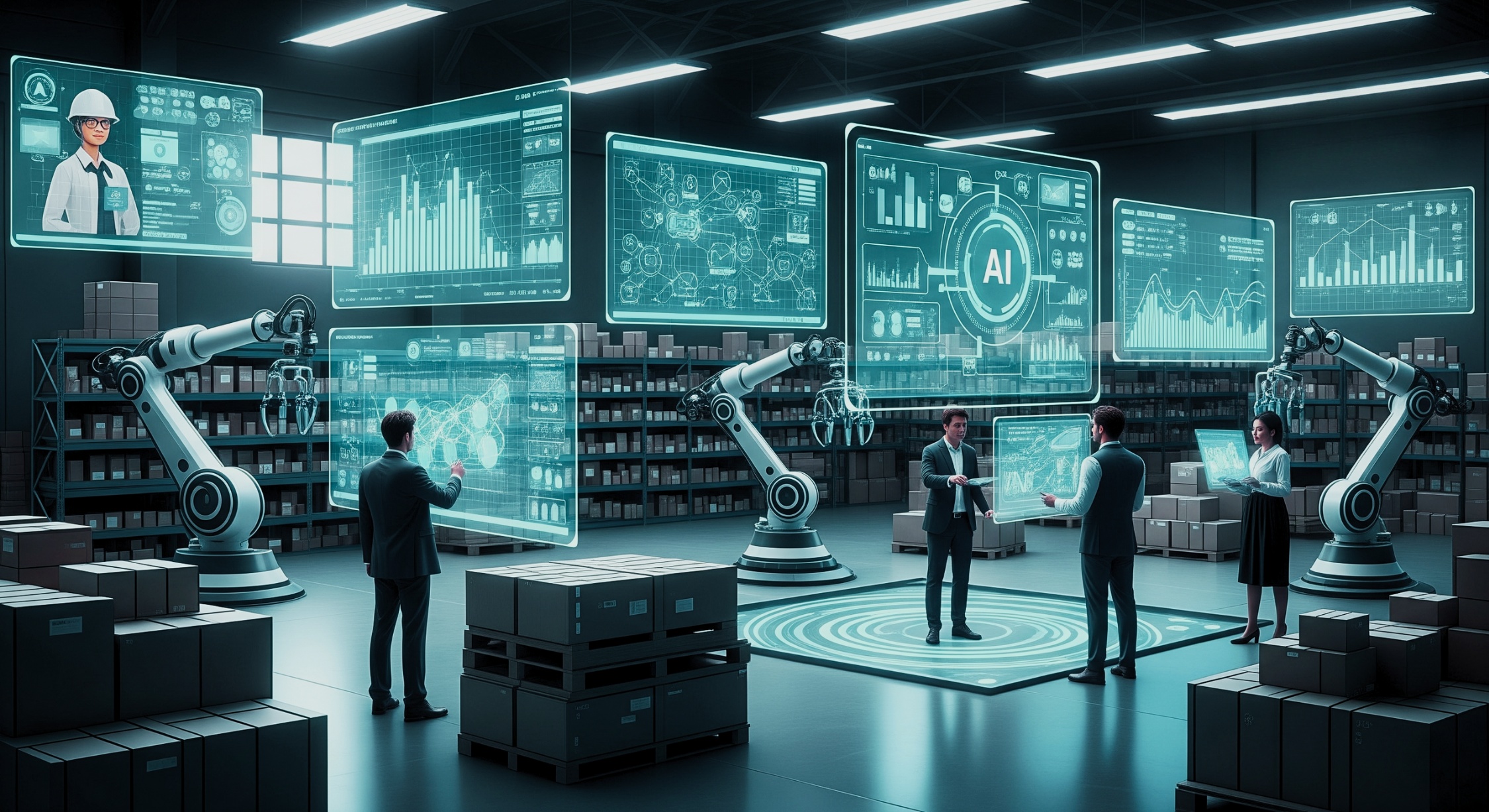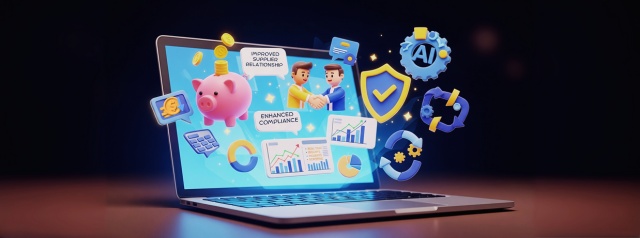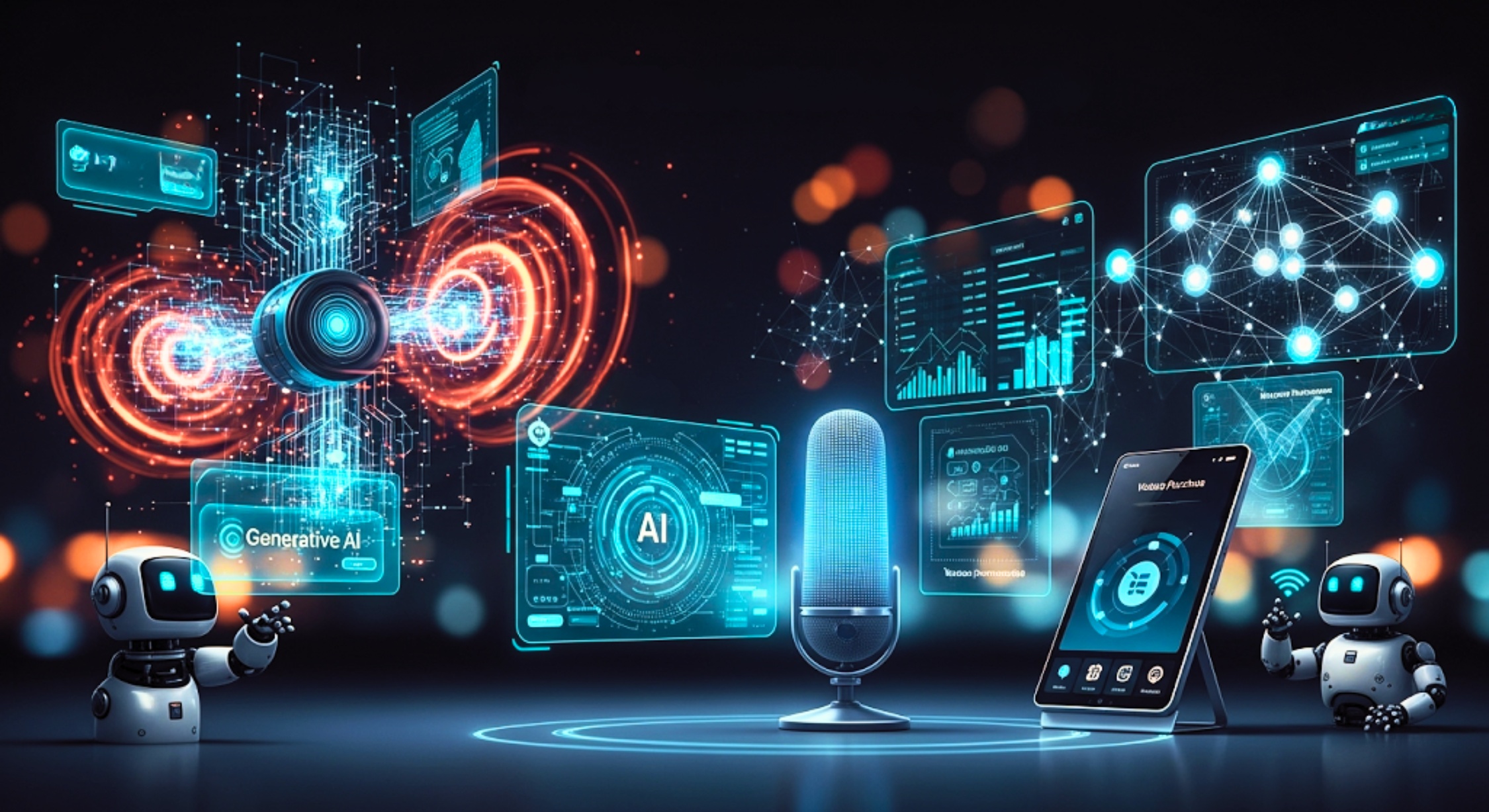For enterprises aiming to control costs and scale smartly, Experion’s data-driven procurement platforms are delivering measurable outcomes. With automation tailored for efficiency and insights that drive decisions, clients are seeing up to 20% in cost savings, proving that the future of procurement is already here.
Procurement used to mean overflowing spreadsheets, endless email threads, and approvals lost in limbo. Contracts sat buried in inboxes, supplier insights came too late, and every decision felt like a guess. It worked until it didn’t.
In today’s fast-moving, data-fueled world, the rules of procurement have changed. Organizations now need more than just tools; they need intelligence. That’s where AI procurement software steps in.
This blog takes you behind the scenes of how artificial intelligence is transforming procurement, making it faster, smarter, and significantly more strategic. You’ll discover the AI technologies driving this shift, the measurable benefits of AI procurement software solutions, and how generative AI procurement software solutions are rewriting the future of sourcing and supply chains.
Understanding AI in Procurement
 AI in procurement refers to the use of technologies like machine learning (ML), natural language processing (NLP), predictive analytics, and robotic process automation (RPA) to automate and enhance procurement operations. Unlike traditional workflows that rely heavily on human intervention, AI procurement software uses algorithms and data-driven logic to streamline sourcing, contract management, supplier selection, and purchasing decisions.
AI in procurement refers to the use of technologies like machine learning (ML), natural language processing (NLP), predictive analytics, and robotic process automation (RPA) to automate and enhance procurement operations. Unlike traditional workflows that rely heavily on human intervention, AI procurement software uses algorithms and data-driven logic to streamline sourcing, contract management, supplier selection, and purchasing decisions.
Here’s what AI brings to the table:
- Automation of repetitive tasks like invoice processing and purchase order approvals.
- Data-informed decisions through real-time analytics and intelligent dashboards.
- Predictive risk management by analyzing supplier performance, market trends, and spend patterns.
- Optimized spend analysis by uncovering cost-saving opportunities in massive datasets.
Key AI Technologies Used in Procurement
- Machine Learning (ML) for Smarter Procurement
ML algorithms are the brain behind automation and intelligent decision-making in AI procurement. These models learn from historical data and identify patterns that help procurement teams make smarter decisions.
Use cases include:
- Spend Classification & Analytics: ML categorizes spending by department, supplier, and product to highlight savings opportunities.
- Supplier Risk Prediction: AI predicts supplier failures using historical data, credit scores, and external news sources.
- Dynamic Pricing Optimization: Adjusts procurement strategies in real-time to changing market conditions.
- Natural Language Processing (NLP) for Contract & Supplier Management
NLP allows machines to read and understand human language, an essential capability when handling contracts or vendor communications.
- Contract Review Automation: NLP extracts critical clauses and renewal dates, reducing legal risk.
- Supplier Chatbots: AI-powered assistants manage inquiries, share documents, and escalate issues.
- Fraud Detection: NLP scans for mismatches or suspicious entries in documents and transactions.
- Predictive Analytics for Demand Forecasting & Inventory Optimization
Procurement teams often struggle with over-ordering or under-stocking. Predictive analytics solves this using data-backed forecasting models.
- Demand Forecasting: Predicts inventory needs based on seasonality, order history, and market changes.
- Inventory Optimization: Reduces waste and improves cash flow by aligning stock levels with projected demand.
- Robotic Process Automation (RPA) for Workflow Automation
RPA bots handle rule-based tasks, perfect for repetitive procurement processes.
- Invoice Matching: RPA matches invoice line items with purchase orders and goods received.
- Auto-PO Generation: Based on predefined thresholds, the system raises purchase orders without human input.
- Audit Trail Maintenance: Every action is logged automatically, ensuring compliance.
Impact of Generative AI in Procurement
Generative AI, a rapidly growing subset of AI, is unlocking entirely new possibilities in procurement. Unlike traditional models that analyze existing data, generative AI procurement software solution create new content, be it contract drafts, supplier summaries, or scenario simulations.
Key use cases include:
- Contract Drafting: Gen AI writes contracts, RFPs, and SOWs with context-specific language.
- Negotiation Playbooks: AI suggests talking points and pricing strategies based on supplier history.
- Procurement Simulations: Models future scenarios for sourcing, demand, and supplier performance.
- Real-Time Reporting: Automatically generates spend analysis reports and compliance dashboards.
According to McKinsey, Gen AI can reduce procurement cycle times by 30-50% while significantly improving decision accuracy. For large procurement teams, this translates to faster deal closures and leaner operations.
Difference Between Traditional and AI-Driven Procurement
|
Aspect |
Traditional Procurement | AI-Driven Procurement |
| Process Speed | Manual approvals, long cycles |
Real-time workflows and auto-approvals |
|
Data Accuracy |
Human errors, siloed data | AI-driven validations and unified systems |
|
Cost Savings |
Limited due to poor visibility |
Spend analysis reveals hidden savings |
|
Supplier Management |
Manual risk evaluation |
Predictive supplier risk scoring |
| Contract Management | Time-consuming reviews |
AI extracts and analyzes contract data |
| Decision-Making | Based on instinct |
Powered by data insights and AI forecasts |
The difference is clear: AI procurement software is an enabler of digital transformation.
The Rise of AI Procurement Software

What is AI Procurement Software?
AI procurement software solutions are intelligent platforms that combine traditional procurement features (like sourcing, requisitioning, and contract management) with advanced AI technologies. The result? A proactive, data-driven procurement system that reduces costs, improves vendor relationships, and speeds up decision-making.
Core capabilities include:
- Process Automation: Handles POs, invoices, and supplier onboarding without manual effort.
- Data Intelligence: Dashboards provide real-time insights into spend, supplier risk, and contract compliance.
- Compliance Tracking: AI flags potential violations based on regulatory changes and internal policies.
- Risk Management: Predicts potential bottlenecks or disruptions before they impact operations.
Types of Procurement AI
- Spend Analytics AI
- Identifies maverick spend and areas for negotiation.
- Analyzes spending trends across categories, geographies, and vendors.
- Recommends bulk buying opportunities and supplier rationalization.
- Supplier Intelligence AI
- Aggregates supplier data from financial reports, social media, ESG scores, and performance reviews.
- Provides automated scoring and benchmarking tools.
- Detects early warning signs of supplier disruption.
- Contract Lifecycle Management (CLM) AI
- Extracts renewal dates, SLAs, penalties, and pricing from contracts.
- Sends alerts for upcoming expirations or non-compliance.
- Uses generative AI procurement software solution to draft new contracts.
- Generative AI Procurement Software Solutions
- Creates RFPs, supplier briefs, negotiation checklists, and evaluation rubrics in minutes.
- Responds to vendor queries using trained large language models (LLMs).
- Simulates negotiation scenarios based on past outcomes.
- Procure-to-Pay (P2P) Automation AI
- Matches invoices with purchase orders and receipts in seconds.
- Identifies duplicate payments or fraud attempts.
- Applies smart rules for approval workflows.
Core Features of AI-Based Procurement Platforms
Modern AI procurement software solutions are far more than automation tools; they’re strategic systems that enable smarter, faster, and more accurate decisions across procurement operations. Below are the core features that set these platforms apart.
- Smart Vendor Selection
AI systems evaluate suppliers based on financial health, delivery history, ESG scores, pricing, certifications, and responsiveness. They recommend the most suitable vendors using predictive models, reducing procurement risks and ensuring optimal value.
- Spend Analytics
Using machine learning, AI procurement platforms automatically classify and analyze spending across departments, categories, and suppliers. This helps organizations identify cost leakages, consolidate vendors, and negotiate better rates.
- Contract Management
AI, especially NLP, extracts and organizes terms, obligations, and renewal dates from complex contracts. Some platforms even use generative AI procurement software solution to auto-draft contracts based on predefined templates and risk parameters.
- Predictive Demand Forecasting
AI analyzes historical purchasing data, sales trends, and external market signals to forecast demand accurately. This ensures better inventory planning and reduces both overstocking and stockouts.
- Risk Management
With access to structured and unstructured data (e.g., news, financial reports, social media), AI scores supplier risk levels and sends early alerts. This predictive insight enables proactive mitigation strategies.
- ERP and Supply Chain Integration
Effective AI procurement platforms don’t operate in silos. They seamlessly integrate with existing ERP systems (like SAP, Oracle, Microsoft Dynamics) and supply chain platforms. This integration ensures real-time data sharing, eliminates duplication, and aligns procurement with broader business goals.
Benefits of Using an AI Procurement Software Solution

Cost Savings Through Intelligent Sourcing
AI identifies the most cost-effective suppliers, suggests bundled purchasing, flags maverick spending, and helps procurement teams stay within budget. According to Accenture, businesses using AI in sourcing report 10–15% savings on average.
Improved Supplier Relationship Management
AI-powered dashboards provide real-time insights into supplier performance, allowing procurement teams to address issues before they escalate. Some platforms include supplier portals with AI-driven communication, improving transparency and trust.
Enhanced Compliance and Reduced Procurement Risk
By monitoring regulations, contract terms, and supplier certifications, AI systems help maintain compliance and prevent breaches. Risk scoring ensures that high-risk vendors are flagged and reviewed proactively.
Real-Time Data Insights and Reporting
Gone are the days of quarterly reporting. AI tools provide live dashboards with KPIs like spend under management, contract compliance, and cycle times. Executives can drill down into data in seconds and make faster decisions.
Scalability and Adaptability to Business Needs
Whether you’re managing $1 million or $1 billion in procurement, AI systems scale effortlessly. They adapt to evolving workflows, regional regulations, and industry-specific challenges, ensuring long-term value.
Real-World Applications and Impact of AI Procurement
From manufacturing to healthcare, businesses across industries are reaping the benefits of AI procurement software.
Industry-Specific Implementations
Manufacturing
AI optimizes inventory levels and forecasts demand based on production schedules. It helps manufacturers reduce excess stock, streamline supplier collaboration, and ensure timely replenishment of raw materials.
Healthcare
Hospitals and healthcare networks use AI procurement tools to automate purchase approvals for critical medical supplies, flag expired contracts, and ensure compliance with regulations like HIPAA or FDA sourcing rules.
Retail
Retailers benefit from demand forecasting, vendor consolidation, and AI-driven negotiations. Seasonal spikes, trend predictions, and supplier management become data-driven, not guesswork.
Logistics
In logistics, AI streamlines vehicle procurement, warehousing contracts, and freight agreements. It optimizes total cost of ownership by considering fuel costs, performance history, and delivery reliability.
Impact on Decision-Making and Operational Efficiency
AI transforms procurement from a reactive function into a strategic advantage.
- Faster Cycle Times: AI reduces manual approvals and automates document handling, cutting cycle times by up to 50%.
- Better Risk Decisions: Predictive risk scoring helps avoid costly supplier failures or non-compliance fines.
- Improved Forecasting: AI enhances planning accuracy, resulting in smoother operations and reduced waste.
- Cross-Team Collaboration: Integration with finance and supply chain improves visibility and alignment.
How to Choose the Right AI Procurement Software Solution
Selecting the right AI procurement software solution requires a clear understanding of your organization’s needs, ecosystem, and future plans.
Key Criteria for Selection
Scalability
Can the solution handle growing procurement volumes, multiple geographies, and complex workflows without performance issues?
Integration Capabilities
Does it integrate with your existing ERP, CRM, inventory, and supply chain systems? Look for solutions with open APIs and proven interoperability.
User-Friendliness
Is the interface intuitive? Can procurement teams quickly learn the system without extensive training?
Customization and Support
Does the vendor offer configurable modules tailored to your industry? Is there dedicated support for implementation, training, and issue resolution?
Ask these key questions before making a decision:
- Does it support generative AI features?
- How is data security handled?
- Can it support multi-language, multi-currency, and compliance standards?
Experion’s AI procurement platforms are built with modular architecture and API-ready design, helping clients integrate effortlessly, scale confidently, and customize workflows to fit evolving business needs.
Implementation Best Practices: AI Procurement Software
Deploying AI procurement tools isn’t a plug-and-play exercise; it requires a thoughtful, phased approach.
Assessment & Strategy
Start with a maturity assessment. Identify procurement pain points, current tools, and desired outcomes. Set KPIs for AI implementation (e.g., cost reduction, cycle time improvement).
Vendor Selection
Evaluate vendors not only on features, but also on industry expertise, support quality, security, and scalability. Pilot the solution with a smaller use case before full rollout.
Data Preparation & Integration
Data is the fuel for AI. Clean and unify procurement data from legacy systems. Ensure seamless integration with ERPs and supply chain platforms.
Phased Rollout & Training
Start with high-impact areas like P2P or contract management. Train procurement teams with real use cases and encourage hands-on learning.
Monitoring & Optimization
Track adoption metrics and system performance. Use analytics to identify gaps and continuously improve. Update models and workflows based on changing business needs.
Training Procurement Teams for AI Adoption
Change can be intimidating. Conduct workshops, offer on-demand tutorials, and provide role-based support. Highlight how AI helps rather than replaces.
Change Management Tips
Communicate clearly. Start small, celebrate quick wins, and involve stakeholders early. Use a champion network within departments to drive adoption organically.
Common Challenges and How to Overcome Them
Even the best tools face resistance or hiccups. Here are the most common barriers and how to beat them.
Resistance to Change in Procurement Teams
Fear of job loss or complexity can slow down adoption. Emphasize that AI enhances roles by removing routine work and enabling strategic focus.
Data Quality and Silos
AI systems require clean, unified data. Invest in data normalization and governance frameworks. Use data lakes and integration layers to bridge silos.
Integration with Legacy Systems
Older ERPs or procurement tools may not be AI-ready. Choose AI solutions with middleware support or that offer lightweight integrations via APIs.
Managing Expectations Around ROI
AI isn’t a magic wand. Set realistic KPIs—like improving sourcing cycle time or reducing invoice discrepancies. Build trust with measurable results from pilot projects.
The Future of AI Procurement Software

The evolution of AI procurement is far from over. Here’s what’s coming next:
Role of Generative AI and Autonomous Sourcing
Gen AI procurement software solution will soon be capable of autonomous sourcing, automatically identifying needs, creating RFPs, evaluating bids, and finalizing contracts without human intervention.
Voice-Based Procurement Assistants
Imagine verbally creating a purchase request or asking about supplier performance. Voice AI will soon bring real-time procurement assistants to the enterprise.
AI in Sustainability and Ethical Sourcing
AI will track supplier ESG compliance, carbon footprint, and ethical standards, enabling organizations to align with sustainable procurement practices and global goals.
Conclusion
The evolution from traditional, manual procurement to AI-driven, predictive procurement marks a profound shift in how organizations create value, manage risk, and drive strategy. In a business landscape where time, accuracy, and agility are paramount, relying on outdated procurement systems is no longer sustainable. The cost of inefficiency, like missed savings, supply chain delays, non-compliance, and poor vendor performance, can no longer be ignored.
AI procurement software solutions represent a new era of procurement: one where automation reduces friction, data informs every decision, and systems learn and improve over time. From automating the procure-to-pay cycle to forecasting demand with pinpoint accuracy, AI allows procurement teams to move from reactive problem-solving to proactive planning. This transformation enables businesses to not only cut costs but also gain competitive agility, better supplier alignment, and enhanced risk control.
Moreover, the emergence of generative AI procurement software solution is pushing these capabilities even further, drafting contracts, simulating negotiation outcomes, and generating real-time reports without manual input. These tools empower teams to focus on strategy, innovation, and collaboration, rather than repetitive administrative tasks.
Procurement teams are becoming strategic partners in growth. They’re helping businesses respond faster to market changes, ensure continuity during disruptions, and uphold sustainability and compliance standards with greater ease.
Whether your goal is to streamline operations, deepen supplier relationships, or gain real-time spend visibility, adopting the right AI procurement software solution is key.
Key Takeaways
- AI brings intelligence, speed, and foresight to procurement functions.
- Generative AI solutions reduce cycle times, automate complex tasks, and elevate decision-making.
- Selecting the right platform requires attention to scalability, integration capabilities, and user-friendliness.
- With proper implementation, businesses can achieve significant cost savings and long-term strategic agility.
- AI procurement software improves supplier relationship management through real-time insights and performance tracking.
- Predictive analytics helps forecast demand and reduce waste in inventory and sourcing.
- NLP and ML technologies automate contract reviews, supplier communications, and risk assessments.
- Integration with ERP and supply chain platforms ensures end-to-end visibility and operational alignment.
- Industry-specific AI procurement solutions unlock tailored value in sectors like healthcare, retail, and manufacturing.
- Future trends such as autonomous sourcing and AI-driven sustainability reporting are reshaping procurement’s strategic role.
With Experion’s data-driven approach, organizations don’t just adopt AI procurement; they master it, transforming procurement into a growth enabler across industries.

